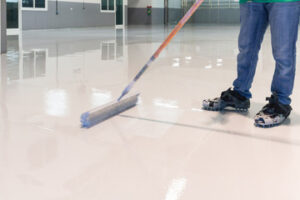Epoxy Flooring Huntsville TX is a popular option for commercial properties, industrial buildings and homes. It is resistant to chemicals and provides excellent durability.

However, it’s important to understand the pros and cons of epoxy before choosing this type of floor. The following information will help you make the right choice for your home or business:
Epoxy flooring is an attractive, hardy floor surface that resists everyday wear and tear, making it a smart investment. It is also a popular choice in areas that are subject to frequent foot or vehicular traffic and is especially suited for industrial applications.
Epoxies create an impenetrable seal over the substrate, preventing moisture damage. This is a huge advantage for commercial and industrial environments that might experience spills or flooding. In addition, epoxy is also easy to clean and hygienic, reducing the risk of contamination.
Durability is one of the key characteristics that set epoxy apart from other materials used to cover floors, including bare concrete and tile. However, the durability of epoxy flooring is dependent on several factors, including the quality of the epoxy substance and flawless installation. A high-quality epoxy system that uses premium resins and curing agents will last much longer than a low-grade epoxy formula that contains inferior components.
In addition, the strength of the concrete substrate plays a significant role in determining how long an epoxy floor will last. If the concrete base is not strong enough, it can easily chip, scratch or dent the epoxy coating. To prevent this, the concrete must be professionally prepared using specialised tools and methods to ensure the epoxy adheres properly.
Epoxy floors are resistant to impact, allowing them to withstand heavy loads, forklift use and even dropping of equipment. Moreover, they are durable against chemicals and can be cured to withstand extreme temperatures. However, it is important to note that this durability can be reduced if the proper maintenance practices are not applied.
Regularly sweeping and vacuuming the floor removes dust, dirt, debris and other contaminants that can scrape or scratch the surface. In addition, it is advisable to use furniture pads on equipment and machinery to reduce the risk of scratches. It is also a good idea to schedule frequent inspections to identify potential problems and to address them promptly.
Scratches and scuffs are to be expected, but if these signs are noticeable throughout the floor or in a large area, it may be time to consider a replacement. Similarly, cracks should be addressed immediately, as they can cause serious problems such as water seepage and mold growth.
Easy Upkeep
While epoxy floors are very durable and can withstand quite a bit of wear and tear, they do require some care and upkeep to stay in their best shape. Regular sweeping and cleaning will help keep sand, dirt and other grit from scratching or etching the floor surface. It is a good idea to sweep or use a dust mop daily in high traffic areas and weekly in less-trafficked areas. It is also a good idea to remove any rugs and furniture to make it easier to clean thoroughly.
In addition to sweeping, it is a good idea to vacuum the floor at least once or twice per week using a commercial or industrial grade vacuum cleaner. This will help keep the floor clean and glistening. You should also avoid dragging heavy equipment across the floor as this can cause scratches and gouges in the epoxy coating. Instead, lift the equipment or use protective pads to reduce the chance of damage.
Spot cleaning is easy on an epoxy floor and can be done immediately when you notice a spill or stain. A simple solution of warm water and soap or diluted ammonia can be used as a cleaner. Be sure to follow the manufacturer’s directions for the specific cleaner you choose.
For tough stains, a soft scrub pad can be used on the surface of the epoxy flooring. Rust stains might require a more abrasive pad. It is important to clean any stains as soon as they happen to prevent them from penetrating the epoxy coating and staining it or damaging the underlying concrete.
There are a few other things that can be done to improve the durability and appearance of an epoxy floor, such as avoiding harsh chemical cleaners and cleaning products with strong acids or citrus solvents (these weaken the epoxy catalyst and cause it to yellow). It is a good idea to sweep and remove debris from the floor before you begin scrubbing, and you should always rinse the floor thoroughly after scrubbing to ensure it is completely dry.
Chemical Resistant
Epoxy is extremely hard and stable, making it a great material for flooring. Additionally, it is highly chemical resistant and resists abrasions. This makes it a fantastic choice for high-traffic areas in homes or businesses where durability is essential. Epoxy floors are also non-porous and do not allow odors, dust, and bacteria to accumulate. This significantly reduces long-term costs associated with cleaning products and procedures.
While epoxy is a great option for floors, there are some things to keep in mind before you make the decision to install it. The first step is to prepare the concrete floor for the application of the coating. This can be done by grinding or shotblasting the surface. In addition to this, you must ensure that the substrate is clean and free of any contaminants. Once this is complete, you can move on to the next phase of the process.
When applying an epoxy coating, it is important to use proper safety equipment. This includes goggles and an OSHA-approved respirator. The fumes emitted during the curing process can be harmful to your health. Additionally, you should wear sturdy boots and shoe covers to protect your feet from any accidental spills or splashes.
Using the proper equipment will ensure that your installation project goes smoothly. It will also prevent any unnecessary delays due to improper installation techniques. A qualified contractor will know the correct methods to follow in order to achieve the best results.
When choosing a chemical resistant epoxy coating, it is critical to look for one that will withstand the chemicals and acids you will be using in your environment. There are many different options on the market, but not all of them will be able to provide you with the level of protection that you need. It is essential to research the different chemicals and acids that you will be using in your environment, so you can be confident that your epoxy floor coating will be able to withstand them.
Silikal’s chemical resistant epoxy coating has been thoroughly tested and can withstand the harshest chemicals, acids, and abrasions. It has a high crosslinking density, which contributes to its impressive durability and resistance. It also has an anti-static additive and is designed to withstand heavy loads. This makes it a good choice for warehouses, factories, and other industrial environments.
Easy to Apply
If you want to revamp your home with a new floor, there are many options on the market. However, each one requires a certain amount of prep work to get the floor ready before applying. If you are looking for a simple and fast flooring option, epoxy is the way to go. This product can be applied over the existing concrete, saving you money and time. It can also be easily cleaned with a broom or power sweeper.
There are some specific conditions that must be met for an epoxy floor coating to work. First, the concrete must be in good condition with no cracks or chips. It must also be properly degreased and acid etched. This is a step that can take several days, but it is necessary to ensure the best results. If the preparation process is not done correctly, it may impact the durability of the epoxy flooring.
Once the concrete has been prepared, you will apply a primer to help the epoxy adhere to the surface. Once that has dried, you can then apply the actual epoxy. Depending on the thickness of the epoxy, you will likely need multiple coats. For the most durable finish, a top coat is recommended. This layer adds a clear, protective finish to the floor and can help increase its longevity.
Epoxy flooring is a great choice for a garage or workshop because it can be easily customized with flakes and other color options. It can also be textured to create a non-skid surface, which is perfect for areas that see a lot of foot traffic or vehicles.
Another advantage of an epoxy floor is that it is water-resistant. This means that any spills won’t soak into the concrete and cause damage. This is particularly beneficial for homes that have a basement or shop that will be exposed to water and other chemicals.
It is important to sweep and clean an epoxy floor regularly to keep it looking good. Regular maintenance can extend the lifespan of your epoxy floor. Sweeping daily will remove dirt and grit and prevent the formation of pits or cracks in the surface. It is also important to mop the floor once a week with a mild cleaning solution.


 When searching for a vacation rental, it is important to consider the property’s location. You will want a location close to the main attractions and restaurants. This will help attract guests and increase your revenue. You will also want to choose a safe neighborhood with easy access to public transportation.
When searching for a vacation rental, it is important to consider the property’s location. You will want a location close to the main attractions and restaurants. This will help attract guests and increase your revenue. You will also want to choose a safe neighborhood with easy access to public transportation.